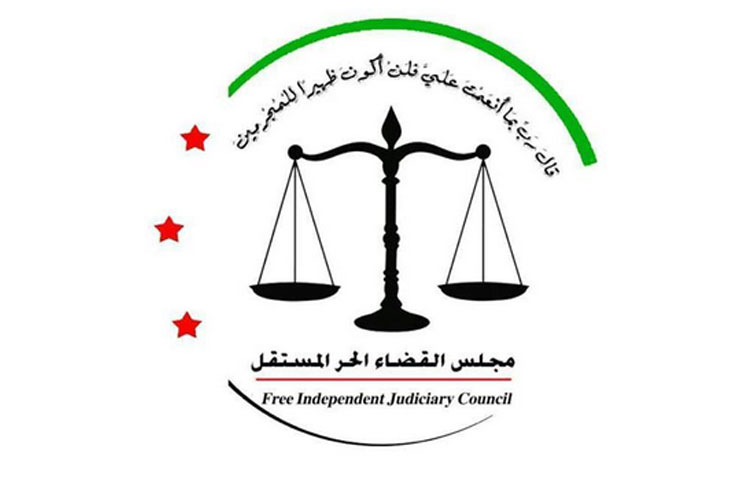
Free Independent Syrian Judiciary Council

Dissidents form a council and armed factions make it fail
According to a legal source that has been following the council since its establishment, ‘The Free Independent Judiciary Council’ was established in September 2012 following the dissidence of four judges. The judges are Anwar Majni from Aleppo, Talal Hushan from Hama, Juma Dibis from Raqqa and Khaled Shihab from Aleppo. The council started a number of initiatives and structures for the judiciary body. Certain judiciary bodies were formed and started functioning early in 2013. These bodies played a significant role; nonetheless, their role was quickly minimized by armed factions which caused the failure of an independent judiciary that might hold the armed factions accountable.
How do armed factions see the Independent Judicial Council?
Armed factions took two different stands towards the Judicial Council which see the implementation of Syrian state law as a temporary necessity until the end of the revolution.
Some armed factions wholly rejected the implementation of the Syrian state law. The ‘extremist’ brigade held this stand. Also, they fought laws and judges and any project that aimed to continue using the Syrian state law because they approach the law as ‘a production of Sultans and implemented in blasphemous countries.’
Furthermore, these brigades do not think that Islamic Sharia can be made into a law. Hence, these brigades implemented illegitimate interpretations of Islamic Sharia in courts. Legalists and jurists see that the brigades’ objective in using these slogans is to maintain their power and authority.
However, what is interesting is that the brigades which hold this strict stand do not acknowledge each other’s established courts because each brigade sees itself as implementing Sharia the right way and considers others to be implementing it wrongfully.
Other brigades want to implement the law, but reject the Syrian state law on the basis it is secular. These are the ‘moderate’ brigades. They insist that it is necessary to replace the Syrian Law with another law that is derived from the Islamic Sharia.
Judge Ibrahim Hussein: The Syrian Coalition is Responsible for Failure of the Legal Council
 There were two main obstacles for the function of the Legal Council which Ibrahim Hussein, Spokesperson and member in the council revealed to Enab Baladi.
There were two main obstacles for the function of the Legal Council which Ibrahim Hussein, Spokesperson and member in the council revealed to Enab Baladi.
The first obstacle was the absence of a judicial authority. The Syrian Coalition as the main representative political opposition is responsible for the absence of a judicial authority. The Syrian Coalition did not take the issue of the judiciary seriously. It did not make an initiative to establish a judicial authority in a way that is similar to its establishment of the Interim Government, as an executive authority. The Legal Council has repeatedly demanded that the Coalition establish this authority but to no avail. This led the Council to issue an official statement to the effect that it has stopped dealing with the Coalition.
In this regard, Deputy Minister of Syrian Interim Government, Khaled al-Helou, told Enab Baladi, ‘Although the Coalition has fallen short in this; however, the Coalition supported the dissident judges of the regime financially and that made them maintain Syrian Laws. Also, that helped them document the regime’s crimes.’ There are efforts to cooperate with the Interim Government to establish a project to administrate liberated areas.
The second obstacle is the absence of an executive authority to implement courts’ decisions. Armed brigades and factions are responsible for this in a complete way. The armed factions did not provide an independent armed force that works in coordination with the judicial facility. In contrary, the armed factions moved to establishing Sharia Boards which are affiliated each with a different armed faction.
In spite of the obstacles that the Legal Council faced, it is still functioning and expanded to include 85 judges. Judge Hussein indicates that they as legal experts collectively reject all courts inside Syria whether Sharia based or Peoples’ Courts. He adds, ‘we said before that these courts are emergency courts, but that does not mean they have not made mistakes. We see that the establishment of these courts in these circumstances, their procedures and mechanism may lead in many instances to the courts’ involvement in war crimes based on the Roma Regime for International Criminal Court. We hold onto our principles and work as legal experts to come out with a unified vision for the future of Syria. We propose our ideas to people and civil organizations and Syrian institutions to deliver our thoughts to brigades and reject the judiciary in the aforementioned form.’
Moreover, he pointed that some parties try to derive legitimacy from armed force. Nonetheless, they can only derive their legitimacy from the people and the state.
continue all topic:
Prominent Judicial Bodies Formed in Liberated Syria
The Phase of Regression: ‘Sheikhs’ Replacing Judges
Peoples’ Courts in Autonomous Administrated Regions
Free Independent Syrian Judiciary Council
Three Authority References Warn of the Division of Syria
Syrian State Law: will its continued implementation help maintain the unity of Syrian territory?
Islamic Sharia: Military Brigades Reject Legal References and Insist on the Implementation of Sharia
Judicial Schemes and the Shape of Laws in Areas outside the control of the Syrian Regime
Judiciary in Aleppo is unable to counter the Hegemony of the Military
Rehabilitative Program for Prisoners in Aleppo
Deraa: The Judiciary Scheme, Shape of laws in it since its Liberation
Eastern Ghouta: Foundation of Independent Judiciary following Liberation
Judiciary is absent from Western Ghouta and Sharia Implementation in Qalamoon
Jaysh al-Fateh Promises to implement a Unified Judicial Reference in Idlib
Al-Nusra Front Controls Judiciary in Lattakia Countryside
Hama Countryside: Absence of Judiciary and Subordination of Khan Sheyhun court
Al-Waer court and resolving dispute by consensus in Homs
Judiciary in Deir ez-Zor terminated by ISIS
Attempts at founding Judiciary in Raqqa were terminated by ISIS
Judiciary System under Baath Rule
How do Syrians value courts’ performance and Judiciary in their liberated areas?
Killing Justice in the North of Syria
Higher Judiciary Institute in Aleppo: First Graduates in Liberated Areas
if you think the article contain wrong information or you have additional details Send Correction
-
Follow us :
Most viewed
- Kurdish Protection Units: Key point of contention between Damascus and SDF
- Arrests and explosive seizures in security campaign in old Damascus
- Syria and Lebanon sign agreement for cooperation in border demarcation
- Struggle for Syrian phosphate awaits fate of Russian contract
- Koya: A border village paying the price for rejecting Israeli presence

















 A
A
A
A
A
A


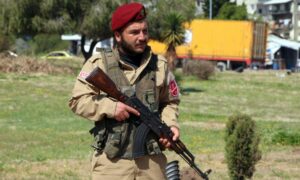
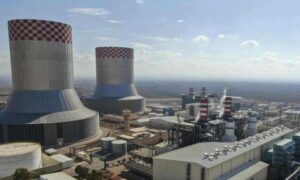
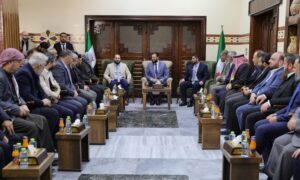

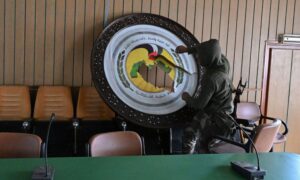
 More Investigations
More Investigations